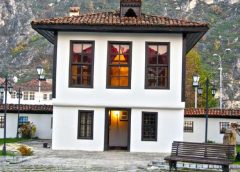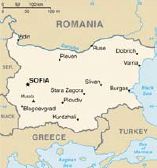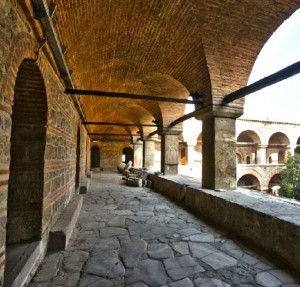
The Bulgarian Muslims who made headlines recently were demanding that they be given their rights.
By MUSTAFA ALIŞ Former Chief Mufti of Bulgaria
Bulgarian Muslims were the first Muslim community to come out of Ottoman rule. Islam played the most significant role in protecting the Muslim Turkish minority in Bulgaria after the Ottomans withdrew from the country in 1878. The Muslim minority has been struggling for 130 years to preserve their Muslim identity despite many hardships and obstacles. Their Islamic awareness was kept vivid and the Muslim Turkish identity was preserved even during harsh times through educational and cultural activities that varied according to time and conditions. The Muslim ethnic Turkish, Pomak and Roma groups who lost their religious identities were quickly assimilated into the majority group, which is Bulgarian. Today, as it was in the past, the protection of the Bulgarian Muslims is dependent on Islamic awareness and enlightenment to a large extent. The establishment of values such as freedom and pluralism has resulted in favourable consequences. Problems stemming from their minority status, and the efforts of western-backed missionary organizations to assimilate Muslim Pomak and Roma people are just two of the difficulties facing the Bulgarian Muslim identity as the largest Muslim population in the European Union. The most effective way to remove these threats is to strengthen Islamic activities that are tied with the legacy of the past, related to present day problems and forward-looking. The office of the Chief Mufti has a most serious and a challenging task in this regard.

Brief Information about the Religious Organization of Bulgarian Muslims
The Bulgarian Muslim Community has about 1.5 million members. The administrators of the community are elected. In national Islamic conferences that are held every five years, a Chief Mufti is elected as the community president and representative, and the president and members of the higher Islamic council are elected as the executive body of the community.
There are currently sixteen regional muftis in Bulgaria. Regional muftis are appointed by the Higher Islamic Council. A regional mufti generally represents one province, but in regions where the Muslim population is small, a mufti may represent more than one province.
The office of the Chief Mufti administers the religious affairs of Bulgarian Muslims, and represents the Muslim community with the Bulgarian administration, as well as with organizations and individuals abroad. Regional muftis are authorized by the Chief Mufti to represent Muslims with the local authorities.
The office of the Chief Mufti is located in the Bulgarian capital Sofia and has twenty-five personnel. The office has various departments overseeing foundations, education, guidance, publishing and accounting. Regional mufti offices have between two to five personnel.
The office of the Chief Mufti manages estates and lands belonging to Muslim foundations through regional muftis and Islamic councils, and follows court procedures to restore foundation assets that have been confiscated by the state and illegally sold by individuals.
The Chief Mufti oversees the Higher Islamic Institute that trains muftis, instructors of religious subjects and imams, three religious high-schools that train imams and preachers, and summer Qur’an schools that provide Qur’anic teaching to children in 500 villages and towns. The office of the Chief Mufti has been preparing the curriculum of the Islamic courses taught at public schools since 2000, as well as providing instructors and textbooks.
The office publishes the magazine “Muslims”, a quarterly periodical published in Turkish and Bulgarian languages, and Islamic books and leaflets.
There are over 1200 mosques and 200 masjids in Bulgaria. Regional mufti offices have appointed 950 imams to these mosques; however, only 150 imams are paid by the office of the Chief Mufti. The rest are either paid by local congregations or are unpaid. Those imams who are working without any salary usually lack training in religious subjects. Eight preachers are tasked by the Chief Mufti to undertake preaching and guidance works under the auspices of regional muftis.
With the office of the Chief Mufti and the regional offices, the Bulgarian Muslim community is a significant establishment in the country, however, the community faces frequent problems and pressure from the authorities. There are several reasons for this:
Legal reasons: Elected Chief Muftis are obliged to register with the Sofia Municipal Court. The procedure of registration takes long time, delays activities of the office of the Chief Mufti and causes division among the Muslims. The Bulgarian Orthodox Church is exempted from registering with the court, which helps in achieving unity within the church.
Economic reasons: The confiscated assets of Muslim foundations, which are the main revenues of the office of the Chief Mufti, have yet to be returned to their owners 15 years after they were confiscated. Financial aid that is allocated to religious communities from the government budget is not distributed in the correct proportions.
Political reasons: Bulgarian authorities sometimes interfere with the election and registration of the Chief Mufti. In 1995, the Bulgarian Socialist Party-led government intervened in the elections for the Chief Mufti and appointed Nedim Gendzhev, former police chief and Chief Mufti during the communist era, ignoring the popularly-elected candidate. The case was taken to the International Court of Human Rights and the court made the Bulgarian government pay compensation.
Political Situation of Bulgarian Muslims
The Movement for Rights and Freedoms (MRF) is a political party that
represents ethnic Bulgarian Turks and Muslims. Although the MRF is not officially an ethnic party, the majority of the Bulgarian Muslims support it and 32 out of 34 lawmakers of the party at the parliament are ethnically Turks. The MRF is a member of the ruling coalition government with the Bulgarian Socialist Party and the party of the former Bulgarian king. The Minister of Disaster Management Policy and the Environment, certain governors and deputy governors are Muslim. In every province, the post of deputy governor is staffed by Muslims. Mayors of certain Muslim-populated cities and the heads of scores of villages are Muslim. Three out of 18 Bulgarian lawmakers at the European Parliament are members of the MRF.
Pious Bulgarian Muslims usually abstain from active politics and comply with the majority of the Bulgarian people with regard to politics and politicians. The MRF mobilizes to increase its votes by promoting the unity of Bulgarian Muslims ahead of parliamentary and municipal elections, but the party tends to lose contact with its electorate soon after the elections. Although Bulgarian Muslim politicians have distanced themselves from religious movements, the MRF is viewed by Bulgarian political groups as an Islamic party. MRF member lawmakers have taken part in religious events in the last three to four years, which pleases the Muslim community. They have recently tried to establish rapport with Muslims by contributing to fast-breaking dinner organizations in the month of Ramadan and by giving cash donations to mosque building projects.
The Bulgarian authorities employ a policy of forcing Muslims to migrate from large cities, and cutting the access of Muslim peasants to education. Thus, the majority of Bulgarian Muslims resides in villages, and lives on farming and livestock breeding. A small number of Muslims established business ventures after communist rule ended. The number of Muslim businessmen is increasing and there are certain large Muslim companies in Bulgaria and abroad. However, just like Muslim politicians, Muslim businessmen are generally not interested in serving the Muslim population.
 Restoration of the Assets of Islamic Foundations
Restoration of the Assets of Islamic Foundations
1. The Turkish school building in Kardzhali (Kircaali) known as the “Madrasa.” The school was founded between 1921 and 1933 by the office of the Chief Mufti to train religious staff for the Muslim minority in Bulgaria. The land the school building was built on belonged to the Muslim community of Kardzhali. The construction of the school was entirely funded by the Muslim community under the control of the Chief Mufti.
The school, which is known as the “Madrasa,” was registered as the property of the Muslim community of Kardzhali in 1947.
The same building was re-registered as state property in an Act dated 20 April 1950 and numbered 122 under the Law on State Property.
The building was named as a cultural monument by the National Institute of Cultural Monuments in a letter dated 31 October 1977 and numbered 3409, and was later announced as state property in an Act dated 15 November 1994 and numbered 7750.
Attempts to return the school building to its owners started after 1992. A petition was sent to the Ministry of Treasury, but the response was negative (petition number/date K-08-00-0143/92). The Muslim community took the case to the Bulgarian Supreme Court. The application was turned down (petition date/number 882/11.05.93).
The Chief Mufti requested from the governor of Kardzhali to return the building to the Muslim community (petition number/date 088/07.02.2001). The governor refused the claim of the Muslim council as the owner of the property and noted a dozen ungrounded allegations.
The Chief Mufti maintains his claim that the historical madrasa building belongs to the Islamic community, and insists on confirming that the building will be used as a museum after required agreements have been signed between the Muslim community and related government bodies.
2. The oldest deed that indicates Taşköprü Mosque in Plovdiv belongs to the Muslim community is numbered 95 and dated 12 September 1939. The courtyard of the mosque was sold the same year. In 1992, the ownership of the mosque was transferred to the new owners of the courtyard.
3. Yanbolu Bedesteni (the roofed market Bezisten) is registered in the records of the Foundation of Vezir-i âzam Atik (Hadim) Ali Paşa. It is quite possible that it was built in the 15th century when Ali Paşa was still Beylerbey of Rumelia (Commander of the Ottoman territories in the Balkans). The market underwent changes throughout the centuries after its construction by the Ottomans and has survived until today. Between the years 1970 and 1975, the market regained its original architecture when additions were removed and the adjacent stores were renovated. The market, which was reopened after restoration, is the only Ottoman market in Bulgaria that has survived.
4. Other Ottoman mosques and artefacts that were confiscated by the Bulgarian administration:
– Ibrahim Paşa Mosque in Razgrad Province was registered as a state property with a decision numbered and dated 13/20.11.96.
– Fatih Mehmet Mosque in the town of Kyustendil (Köstendil) was registered as a state property in a decision numbered and dated 3859/10.05.1996.
– Bayrakli Mosque in the town of Samokov was named as a cultural monument in 1928 and has been used as a museum since 1964. Although it is not officially a state property, Muslims are not allowed to use it.
– Eski Cami (Old Mosque) in Stara Zagora was named as a cultural monument in 1954. Muslims are not allowed to use the mosque, although it is not officially declared as state property.
– Haci Hüseyin Mosque in the town of Belogradchik was built in 1771 and is used as a museum today.
– The mosque in Montana Province was registered as a cultural monument in 1964. Muslims are not allowed to use the mosque, although it is not officially a state property.
– Kurşunlu Mosque in the town of town of Karlovo was made into a museum in 1964. Although it is not officially a state property, Muslims are not allowed to use the mosque.
– Eski Cami (Old Mosque) in the city of Vratsa was named as a cultural monument in 1972. Although it is not officially a state property, Muslims are not allowed to use the mosque.
These are some of the assets of the Muslim community that are yet to be returned to their owners. The number of foundation immovable properties that are waiting to be returned is 120.
The Muslim lands that were confiscated by the state total approximately 1630 hectares.
Efforts at Christianization
1. The efforts of the Orthodox Church to Christianize other people are limited and only a certain number of people are actively involved in proselytizing. A priest called Boyan Sariev is a leading figure in Christianization activities. Born as a Muslim Pomak, Sriev graduated from the Police Academy and worked as religious personnel for the Bulgarian intelligence agency.
Sariev resides in Kardzhali and presides over the Sveti Yoan Predtecha Christianity and Development Movement. He is actively involved in proselytizing among Muslim Turks and Pomaks in Ivaylovgrad, Krumovgrad, Egrek, Avren and Kirkovo towns and villages of Kardzhali Province and Nedelino, Zlatograd and Startsevo towns of Smolyan city. Sariev carries out social relief activities and sometimes attracts Muslims who have lost their identities by offering them large sums of cash. He even Christianizes children in orphanages by baptizing them. He is particularly interested in the orphanages in Kardzhali Province and Haskovo town. It is said that 15 Pomak students are funded by Sariev to study at Christian seminaries. The Sariev-led evangelical movement is building churches in Muslim villages where no Christians live. Furthermore, when Muslims attempt to build mosques in the above-mentioned towns and villages, Sariev exerts pressure on municipal and government bodies to prevent their construction.
Although Sariev is apparently not on good terms with the Orthodox Church, he has the strategic support of the church. He is particularly supported by the Bulgarian intelligence agency.
2. Followers of the Protestant Christian denominations such as Evangelism, Methodism and Jehovah’s Witnesses are active in Bulgaria. They particularly target Muslim Roma people. Although there are no official figures, the population of the Roma people in Bulgaria is estimated to be around one million. The majority of them were Muslim until a decade ago; however, the majority is believed to be Christian today. Proselytizing activities among the Roma people are carried out by missionary organizations that have support in Germany, Switzerland and the United States. These organizations have been donating food and clothes to impoverished Bulgarians, which attracts Muslims to the church. Church-houses are being built in almost every village and neighborhood where Roma people live. They place high-achieving Roma youngsters in institutes around Bulgaria or abroad, and train them as pastors. They try to spread Christianity by building orphanages, hospitals and clinics. The Roma people living in the western Bulgarian regions of Montana, Vidin, Vratsa and Kyustendil have lost their Muslim identity thanks to missionary activities.
Missionary organizations are trying to Christianize Pomak Muslims of Smolyan, Devin and Kirkovo. They have been distributing cassettes and books as well as showing videos about Christianity in ethnic Turkish villages, but their efforts have so far failed to bear any results.
The office of the Chief Mufti and regional mufti offices are struggling hard to inform Muslims about Islam and gain back those who have converted to other religions. Magazines and books are published, and the children of Muslims residing in regions where missionary activities are widespread are educated in Islamic schools. Fast-breaking dinners are organized and sacrificial meat is distributed during the Eid al-Adha. Quran teaching classes are held in the summer. Special religious and cultural programs are organized on certain holy days. This year about 4000 Roma children were circumcised. Fifteen instructors were sent to Vidin, Montana and Vratsa, where no Islamic activities have been carried out for fifteen years, to teach Muslim children how to read the Quran. A masjid was built and more are planned to be built.
These are short-term activities. Mid- and long-term plans include sending children of Muslim families to religious high-schools and seminars, and training them as religious staff. We are also planning to provide them with education in fields other than religion and get them to provide political, administrative and social services to their community.
The Future of Islam in Bulgaria
The Bulgarian administration has tried for long years to assimilate the Muslim population. The efforts of Christianization have not halted, but are ongoing in different forms. Muslim youngsters have become more aware of their religious identity since the end of communist rule. The number of pious youngsters who are studying in national seminars and serving as religious personnel is increasing. Peasant Muslims who live on farming and livestock breeding are becoming more religiously aware.
On the other hand, Christian Bulgarians are getting more interested in Islam and there are even some Bulgarians who have converted to Islam. Some Bulgarians conceal the fact that they have converted to Islam due to certain family problems, therefore it is hard to know the exact number of Muslims in the country.
It should be noted that those who have recently accepted Islam are usually educated and new Muslims have the potential to set an example for the Bulgarian people. The level of education among those who have converted to Christianity is very low. When urged to accept Islam, the Roma people who have converted to Christianity repent and convert to Islam, since most of them pretended to have accepted Christianity to receive aid from Protestant organizations.
We believe that the Bulgarian Muslim population will increase in the future and Muslims will become more aware of their Islamic identity.

